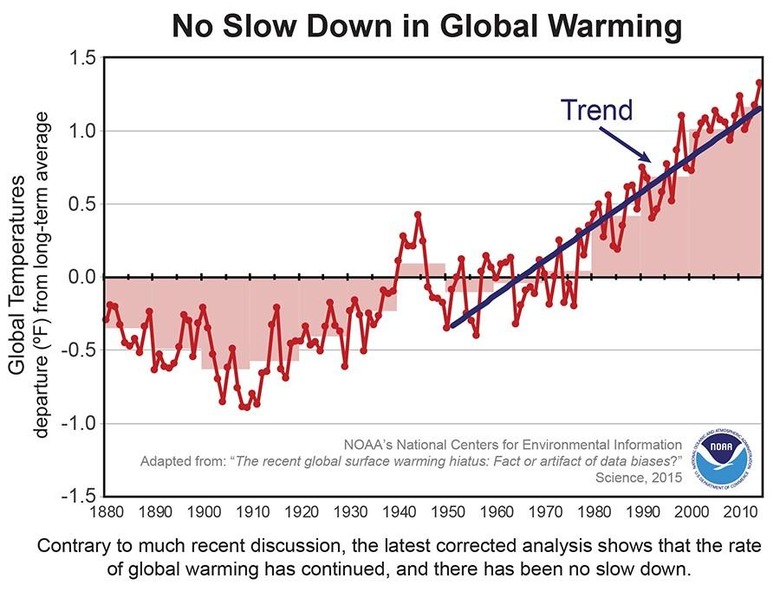Climate Change "Hiatus" A False Hope Says NOAA
No global warming slow-down, no "hiatus": climate change is real and if anything it could be getting faster, US scientists have warned. Challenging claims that Earth temperature levels had plateaued in recent years, the researchers from the National Oceanic and Atmospheric Administration's (NOAA) National Centers for Environmental Information blamed poor quality historic records, along with failures in how different sources of data were balanced, for mistakenly suggesting that the situation had improved.
The "hiatus", as it has come to be known, was a conclusion drawn from the Intergovernmental Panel on Climate Change's (IPCC) Fifth Assessment Report. Released between September 2014 and November 2014, among its conclusions was the argument that rising global temperature trends were notably lower from 1998 through 2012, than they were between 1951 and 2012.
That was taken by many as a sign that global warming was slowing down, and potentially even something that was occurring naturally – and thus need not be addressed by humanity – rather than of man-made cause.
Not so, NOAA says today. After factoring in 2013 and 2014 data, and more accurately homogenizing results from different sources, their conclusion is that far from slowing down, the last fifteen years have easily been as fast in terms of warming rates.

2014 set records for being the hottest year on record, though even that has proved to be a controversial statement. The NOAA teams took sea surface temperature and land surface air temperature datasets, and a more accurate way of correcting for the differences in buoy and ship-based collection.
Buoys, which have been the most common sea-based method of sampling since the 1970s, are more accurate and consistent, the researchers argue. Before that, ships would sample in a variety of ways, at different times of day.
However, buoy data also skews cooler, they point out, and so if pre/post 1970s data is to be accurately compared, that has to be taken into account as well. The new figures also took into account how each sampling was carried out on ships, to better shape the adjustments.
"Adding in the last two years of global surface temperature data and other improvements in the quality of the observed record provide evidence that contradict the notion of a hiatus in recent global warming trends," Thomas R. Karl, L.H.D., Director of NOAA's National Centers for Environmental Information explained.
"Our new analysis suggests that the apparent hiatus may have been largely the result of limitations in past datasets," Karl continued, "and that the rate of warming over the first 15 years of this century has, in fact, been as fast or faster than that seen over the last half of the 20th century."
Combined with a broader distribution of sampling – filling in gaps overlooked by the IPCC – it makes for ominous reading overall, particularly when you consider recent research indicates climate change could lead to 16-percent of species going extinct.
SOURCE Science
